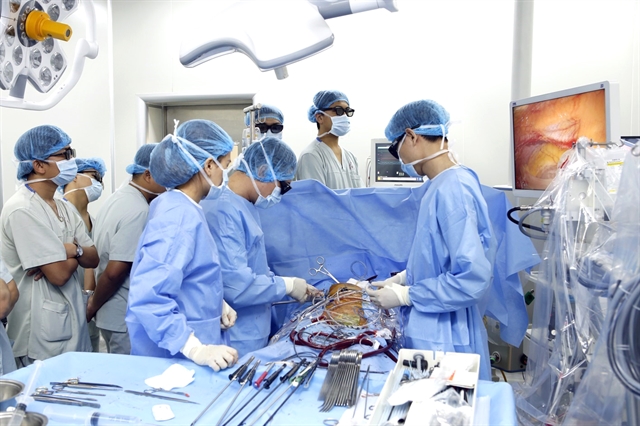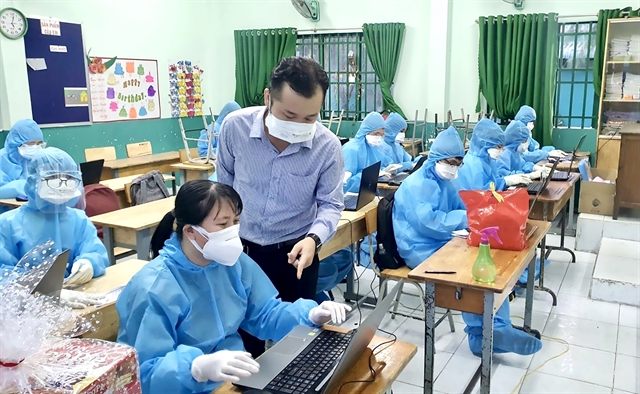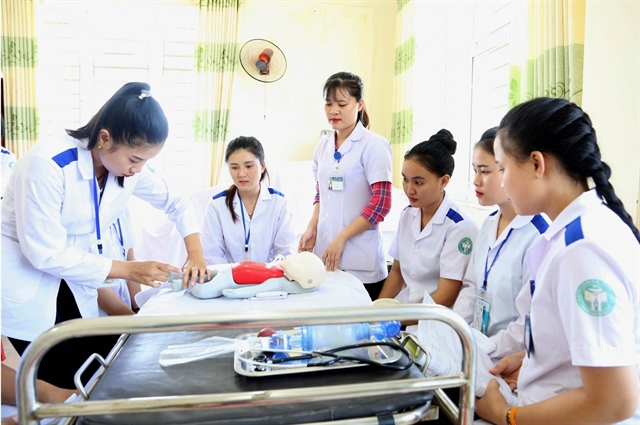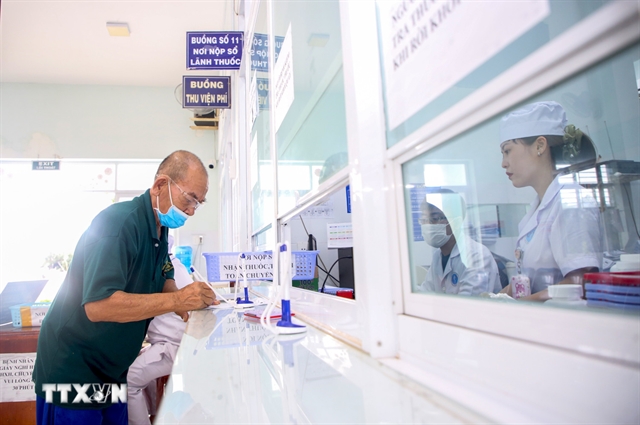 Society
Society

 |
| Medical students observe endoscopic heart surgery with 3D technology at E Hospital in Hà Nội. VNA/VNS Photo Dương Ngọc |
HÀ NỘI – Health experts have raised concerns over universities quickly opening healthcare majors and enrolling students in the past several years, which is likely to reduce the qualifications of future health workers if training quality is not assured.
Nguyễn Đình Liên, head of Hà Nội-based E Hospital’s Nephrology and Urology Surgery Department who is also a lecturer at the Hanoi University of Pharmacy, told the Vietnam Education E-Journal that many universities open training majors in healthcare to satisfy demand in the labour market.
The country is facing a serious shortage of doctors and nurses, so when schools enroll students in these majors, a large number of personnel will be added in this field.
Before 2016, healthcare-related majors were only available at a few schools, such as Hanoi Medical University, HCM City Medical and Pharmaceutical University, Thái Nguyên Medical University and Cần Thơ University.
But things have changed in recent years. More and more schools have opened majors related to healthcare, he said.
However, in order to open healthcare majors, especially in the fields of medicine and pharmacy, higher education institutions must meet all the requirements for quality assurance.
The schools that provide healthcare majors have to observe regulations on curricula, and plans and contracts on practical training, as well as requirements for practical training organisation.
In addition, the schools must meet all the requirements and procedures to open new training majors stipulated in Circular No 22 released by the Ministry of Education and Training, he said.
Unfortunately, in Việt Nam, not all universities can guarantee the quality of teaching staff, modern facilities, and practice facilities to serve the teaching of this field.
“Expanding the medical and pharmaceutical training in ‘non-specialist’ universities is not necessarily a good sign because it is difficult to ensure the training quality if these schools fail to satisfy requirements as stipulated by law,” he said.
The expert said schools specialising in healthcare training majors have set up their own practice facilities, which are hospitals at the school, or signed contracts with large hospitals. These schools gather leading professors who both teach at schools and guide students at hospitals.
Liên cited Hanoi Medical University as an example. The school has Hanoi Medical University Hospital as its own practice facility. In addition, the school has cooperated with Bạch Mai Hospital, Vietnam-Germany Friendship Hospital, and E Hospital to train students professionally, conveniently and methodically.
Meanwhile, schools with newly-opened healthcare training majors will find it difficult to have such a network with prestigious and quality hospitals, especially local schools or private schools with limited funding.
 |
| Medical students volunteer to work at a COVID-19 testing point in HCM City. VNA/VNS Photo Hồng Giang |
Liên said the medical and pharmaceutical industry has always received public attention as people assume that medical and pharmaceutical graduates have well-paid jobs and gain respect from society.
Medicine and pharmacy universities have always had the highest university admission rankings to elect students with sufficient academic ability suitable to acquire knowledge of medicine and pharmacy.
A new healthcare training graduate from a multidisciplinary school is often as attractive as those of prestigious, traditional brand schools. Liên questioned the training quality when schools are trying to attract students by lowering enrollment standards.
Lê Viết Khuyến, former Deputy Director of the Ministry of Education and Training’s Higher Education Department, said universities need to announce the results of the accreditation if they want to enroll students for their new healthcare training majors.
In case the accreditation is not available, the schools should only train a small number of students. These students will be tested for accreditation after they complete their study.
Khuyến said schools have the right to provide these majors, but they must ensure accountability and transparency in curricula, facilities, practical training and teaching staff. If the test results are unsatisfactory, the schools will be required to stop training.
The ministry is responsible for ensuring the quality of training activities, he said. To do so, it is necessary to mobilise health experts, doctors and scientists to participate in the accrediting and quality assurance councils.
 |
| Medical students learn the technical process of newborn care at Hà Tĩnh Medical College. VNA/VNS Photo Anh Tuấn |
According to Liên, Việt Nam should build a system of granting certificates for national standard training majors. This system will survey and evaluate the quality of healthcare students to create a healthy competition and job opportunities for all graduates. Based on it, schools would improve their training quality so that their students can meet standards.
In addition, it is necessary to involve medical associations and university associations in the accreditation of training activities of schools.
An annual monitoring and inspection system on the training capacity of newly opened medical and pharmaceutical schools should be set up.
“Medical staff with good professional quality will help improve medical examination and treatment. If the quality of medical staff is low, it will increase the rate of medical errors and incidents, reducing the quality of medical care. Therefore, the stage of assessing the schools’ training capacity needs to be focused on," he said. – VNS




